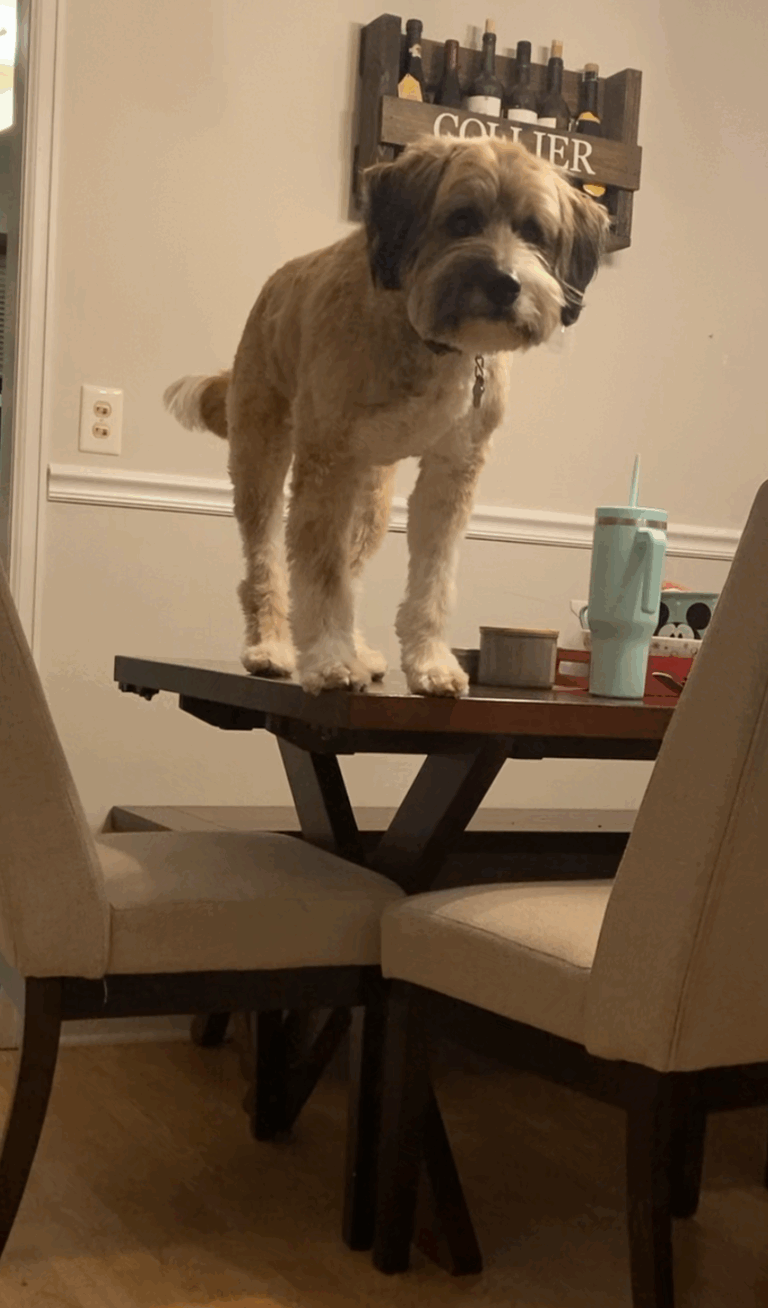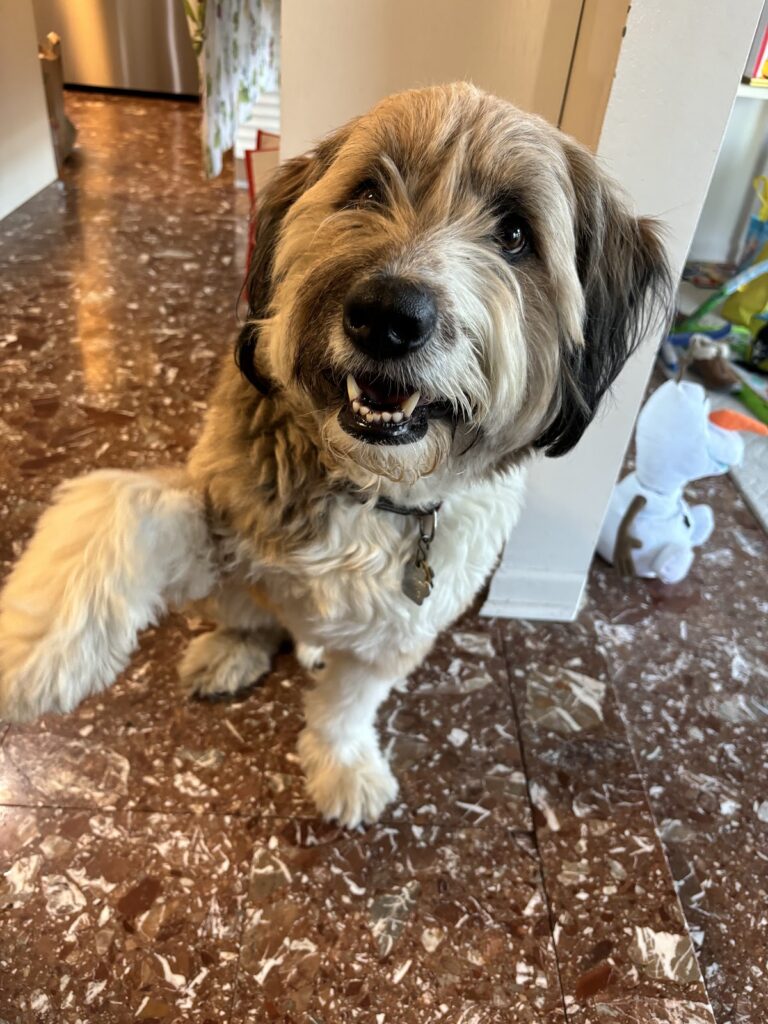If you want me to get on a soap box, just say “You can’t teach old dogs new tricks,” step aside, and hold your britches.
Excuse me?
What’s that you said?
You said, “You can’t teach an old dog new tricks?!?!?!”
Well then, you can explain why, earlier this year, my 9 year old pup was standing on top of our dinner table when I emerged from putting the kids down to bed.
Am I proud of that? No. (Well kinda, he’s such a problem solver and helpful hand!)
Am I embarrassed that I’m a certified dog trainer whose dog now climbs onto the table when we’re not looking? Yes. (But also, how about that confidence in my boy!!!)
Am I constantly enamored, impressed (and sometimes flabbergasted) by this big beautiful brain my Opie Dog has? Absolutely.
Old dogs can certainly learn new tricks, and you can certainly teach them (or they might just figure it out themselves).
Let me tell you why.

Training is How We Support Learning
*Puts on Nerd Hat* Learning is the learner just making choices on how to behave based on experience… and behaving is just what the learner does in an environment to access consequences. So barring any medical exceptions, you can train a dog at any age because they are interacting with an environment at any age.
*Ahhhhhh, takes Nerd Hat off and puts Relatable Hat back on*
Dogs at any age can, and should, continue to learn “new tricks”. My argument is that as animals age, they experience life differently and often need to interact with things in a different way. If we want to increase their welfare and wellbeing, we should reflect and plan for how we can support them in these transitions. Check out MaryKaye’s blog on life with an elder gentleman for some things to look out for.
Finding Learning Opportunities
I’m not saying that your 10 year old poodle needs to learn agility or your 6 year old dane needs to sit pretty, but we can use real-life situations to guide our senior dogs’ learning and support them in their golden years.
Here are some scenarios to give you an idea of what I’m talking about:
- Pup is taking the stairs slower than usual. Working with the vet, we train him to plank his front legs on a low stepper to strengthen the hind end.
- Pup’s family adopted a baby and the dog never needed a safe spot before, but now we train a relaxation protocol for her to relax on a mat in her own space while baby does baby things.
- Pup is showing discomfort with longer walks and the vet has recommended more rest, so we replace half of the walk by helping him learn to forage in the yard.
- Pup is losing her hearing and can’t reliably respond to cues, so we teach a cue transfer to a visual cue for an already learned behavior.
- Pup is going outside more frequently to use the bathroom and the family is tired of wiping paws every time she comes in, so we teach the dog to spin on a towel/mat/rug.
- Pup just got adopted after being surrendered and in a shelter for a long time, so we build confidence and relationships through free shaping.
- Pup and person are just both kinda bored but they love spending time working together, so they learn some cute Canine Freestyle moves.
- Pup is pushing through the front storm door when we load up the car (don’t look at me, I don’t know what you’re talking about) so that we have to chase him and bring him back inside or near us, so we train him to station on the couch when the door opens, and shut the big door when we play outside. 🫣

There can be so many practical and frivolous reasons to teach your senior dog new tricks, but really it goes back to the adage: Observe with your senses, not your stories. Evaluate (and re-evaluate) the life your senior dog is living. Reflect on what skills, in this current season of life, your buddy already has, and what they might need to add. Things you may be thinking:
- Is it going to be harder to train a senior? Maybe for some if they haven’t practiced training skills.
- Is it going to take longer to train a senior? Possibly, if a different behavior has been rehearsed repeatedly.
- Is it going to be more frustrating? That, my friend, is for you to decide.
- Is it going to be worth it? Almost definitely, yes.
Give those senior doggos a scratch for me (and maybe overlook their naughty behaviors that give you a glimpse of the troublemaker they used to be) and celebrate their big beautiful brains that are ready to learn at any age.
Here’s to harmony,
Corinne
Now What?
Want to reconnect with your senior pet through training and don’t know where to start? Try target training! Set out a towel between you and your pet. When any part of their body touches the towel say “yes” and give a treat. Toss a treat off and repeat! This can expand to cooperative care, stationing, or even rolling the towel for balance work.
- Send us videos or comment below to tell us about how you’re working with your senior dogs! Email info@petharmonytraining.com or tag us @petharmonytraining on our socials
- Feeling stuck? Book a session with one of our behavior consultants to dive into what would support your journey.
Copyright 2025 Pet Harmony, LLC. All Rights Reserved.
Terms & Conditions, Privacy Policy
Results are not guaranteed because behavior, human, canine, or otherwise, are not guaranteeable.


